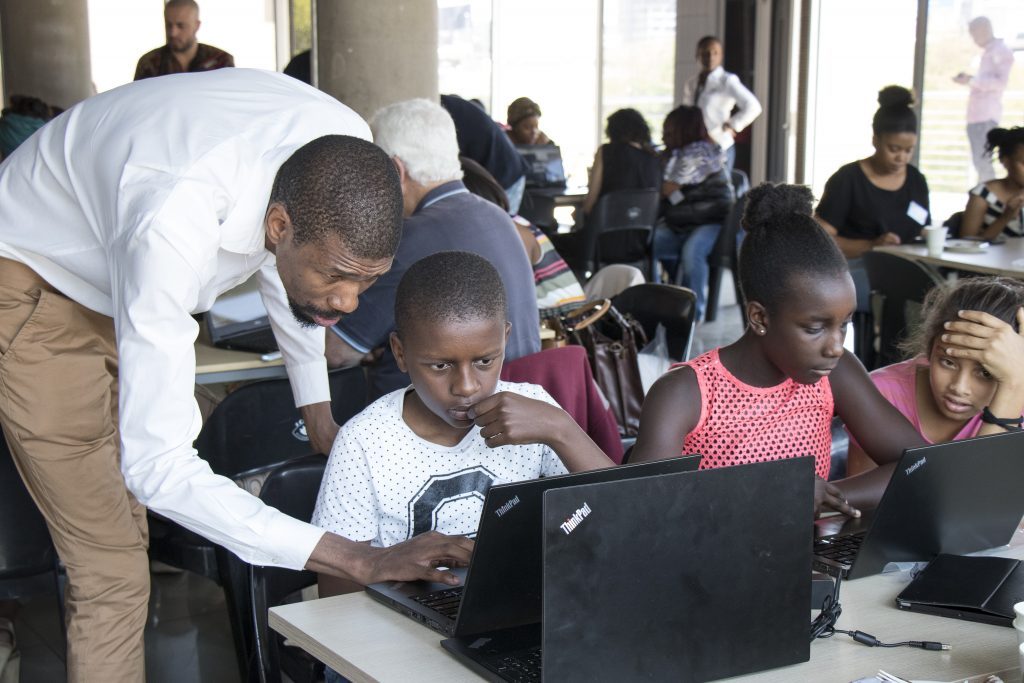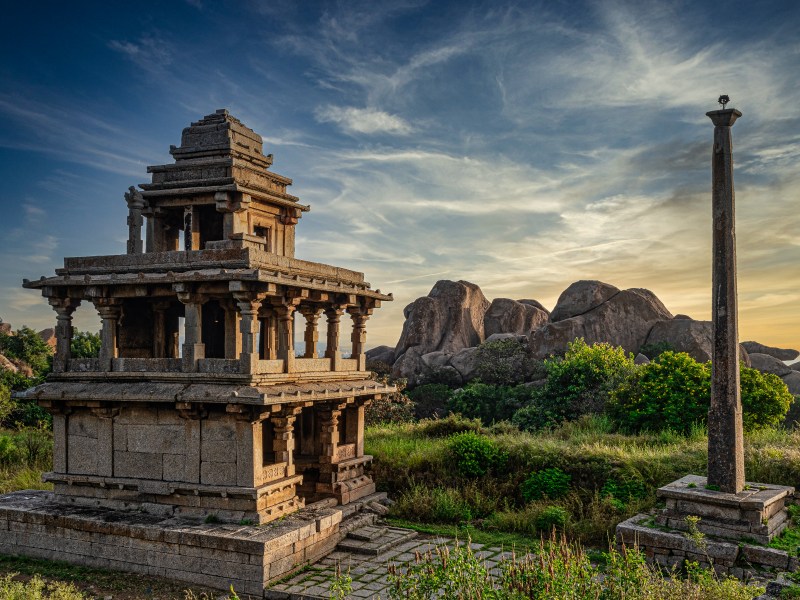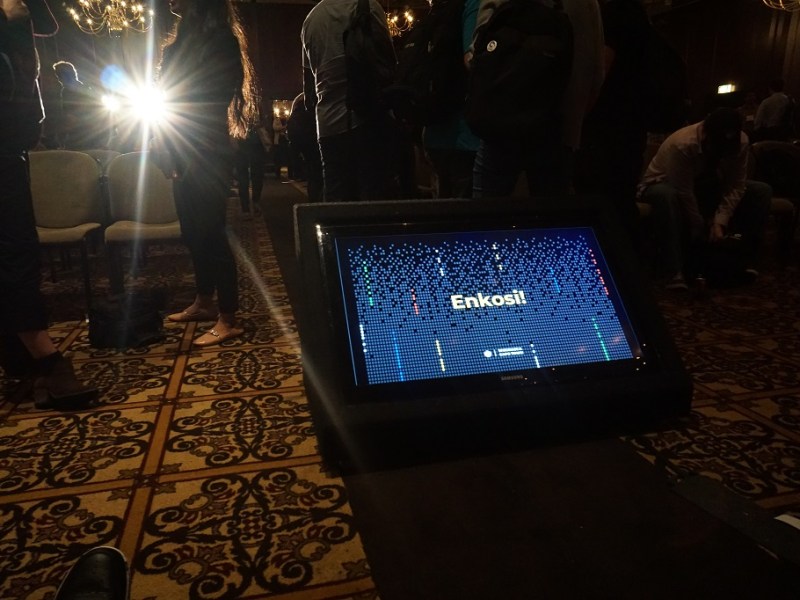“I’m editing the page for the star Proxima Centauri. It’s missing something about the planet Proxima b, so I should fix it”. These are the words of 12-year-old Michael—surprisingly confident for someone contributing to Wikipedia for the first time.
“Have you found a reference for it?,” asked a Wikimedia volunteer editor, to which Michael replied with his own question: “What do you mean?” That kicked off a learning session with Michael, his teachers, and the editor, who used the opportunity to educate Michael about the importance of making sure he was citing information from reliable, published sources.
This was just one of many positive interactions at #Afrocreation, a day of storytelling and learning held last October in Johannesburg, South Africa, as part of the larger WikiAfrica Education initiative. Over 50 teachers and 20 students participated in the an edit-a-thon-style event by contributing to Wikipedia for the first time and discussing ways to bring it into the classroom.
#Afrocreation was held at the Sci-Bono Discovery Centre, a science museum, and was organised by the Moleskine Foundation, an education non-profit that has been promoting Wikimedia-related projects—especially those in Africa—since 2006. We did this in partnership with BRIDGE, a teacher development network, and Wikimedia ZA, an independent local chapter focused on expanding the Wikimedia movement in South Africa.
Bobby Shabangu and Dumisani Ndubane, two of the leading Wikimedia editors in the Isiswati and Xitsonga languages (respectively), led participants in learning how to create their own pages, empowering them to share knowledge on subjects ranging from their favourite South African author to their local township.
After the event, Lorenzo Newman, the Moleskine Foundation’s program manager, sat down to chat with Bobby and Berkia Banda, the principal of the African School for Excellence. Their answers have been minimally edited for clarity.
———
Lorenzo: What Wikimedia page did you produce today?
Bobby: Today I found time to create content myself. I created a page about the place that was hosting us, the Sci-Bono Center. It was just one line, but I wanted to show participants how to create a page on Wikipedia.
Berkia: I created a page for the elementary school I attended. It was easy!
Lorenzo: What makes you think young people in South Africa should be contributing to Wikimedia?
Bobby: Wikipedia is dominated by the English Wikipedia and that first of all affects how the content is conveyed. I think if South African kids created content by themselves and they are all mother tongues, it would give them a voice, their own voice. So rather than having some people coming and creating an article for Africans, why not Africans create articles for themselves in their own languages? I think it’s important for us to speak in our own voice.
Berkia: Based on our experiences since 2017, we have decided to make Wikimedia a part of what we do, specifically within social sciences. History students have a local history unit where they produce an essay on their local community. One of our students suggested producing a Wikimedia entry on a local person or place instead. This allows us to complete an assignment while creating content. Starting next year we’ll be doing this with all our grade 8s, with the support of the WikiAfrica Education program.
Lorenzo: What can teachers do to bring Wikimedia into the classroom?
Bobby: I think what is really important with this project in particular is that we are teaching the teachers and not only the students themselves. The teacher is a source, and he or she has an audience, so invariably you are teaching a lot of people when you are teaching the source. This gives us a chance to reach out to wider audiences.
Berkia: Leave the kids alone! But in real terms, teachers have an important role to play by creating the right environment. It’s in schools and places like this event where teachers can create an environment where peer work is valued, mistakes can be made and people are not afraid to be themselves. As much as you have excitement about Wikimedia from young people, you need teachers to drive things. Young people need role models in their life. In many cases these are teachers, who can demonstrate to young people that they can not only be consumers of knowledge but producers of knowledge.
Lorenzo: What can the Wikimedia community do to help teachers?
Bobby: Having more projects like this will actually help the teachers, because the more the teachers have experience in editing Wikipedia the more it helps them teaching the kids and getting information out there about Wikipedia.
Berkia: Wikimedians can act as a support base. Once teachers and others have been in a setting such as this event, they can get over-enthusiastic and want to try out main things. Wikimedians can advise them on how to overcome practical hurdles. Wikimedians are closer to the ground and can be a form of ongoing support by listening to the challenges teachers face. Working together with teachers, Wkimedians, and students, we can have a very powerful process of knowledge creation.
Lorenzo: What can organisations like the Moleskine Foundation do to support this process?
Bobby: What Moleskine Foundation has started is the first step in the right direction. This was only a pilot project for now, but if a lot of schools could be brought together to participate in a project like this, this thing can actually grow to reach the whole of South Africa, which is something that we need. We don’t want this information to be confined only to the province of Johannesburg, but also to spread around South Africa, so that the message gets everywhere, especially to the rural areas.
One of the things we are struggling with in South Africa, especially in rural areas, are the tools, like cell phones and computers, the tools that help us create content. I think if Moleskine Foundation can contribute with such things, especially off-line editing tools, it can really help a lot. We won’t only rely on data, but have students and Wikimedians who are able to edit off-line and then continue on-line with the content edited off-line.
Berkia: More regular events like the one we had today, where lots of people are in the same room are needed. They allow teachers, Wikimedians and students to listen to one another’s stories, which is very powerful. It’s too often the case that curriculums are designed without listening to students, with the expectation that they just absorb information. This sort of event allows students’ voices to be heard and to share success stories and challenges, which is badly needed. Organisations like the Moleskine Foundation can give these players opportunities to touch base with one another.
———
Michael’s contribution to the Wikipedia article about Alpha Centauri was deleted soon after the event for style reasons, but his teachers are committed to helping him learn more so that the his next experience is different. 25 of the secondary school teachers who took part in the event volunteered to form a community of practice that will share challenges and successes in bringing Wikimedia into the classroom to more than 500 students, helping their schools shift from being knowledge consumers to knowledge producers.
By joining the WikiAfrica Education community, these teachers—representative of all the major subjects—have committed to working with their students to create and expand articles about local places and heroes and stories in local languages, all in an effort to decolonise the internet. BRIDGE will facilitate this process with the invaluable support of volunteer Wikimedians, both backed by the Moleskine Foundation.
Places are currently limited, but interested teachers can reach out to BRIDGE at info[at]bridge.org.za to join the WikiAfrica Education initiative—a programme is helping learners take the lead in re-branding Africa online, inspiring a new generation of online content creators.
Lorenzo Newman, Program Manager
Moleskine Foundation



